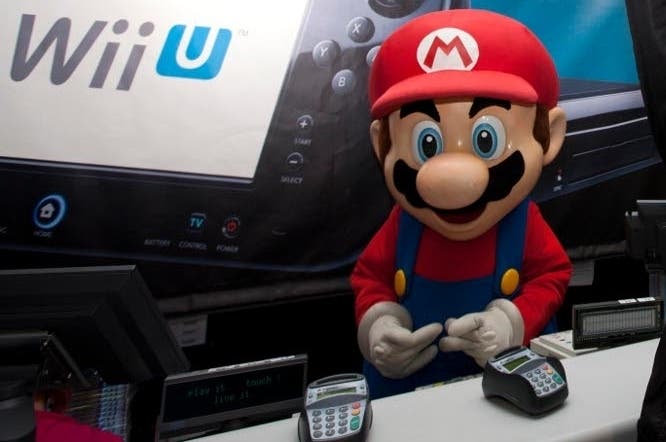Nintendo's Wii U sales struggle
Exclusives are coming, but is it already too late? Eurogamer investigates.
This week Nintendo will release its crucial third-quarter sales results and reveal how Wii U fared during its initial two months on sale. The company had promised to ship 5.5 million Wii U consoles by the end of March and end the financial year back in the black, thus avoiding a repeat of last year's damaging loss - the first in the company's history.
The loss was described as a blip that occurred as Nintendo price-dropped the 3DS and wrapped up costly research and design on the Wii U. It was a cost the company would not repeat, Nintendo boss Satoru Iwata told investors. But profits for this year have already been revised down. In October, Nintendo forecasted a new, slimmer earnings margin for the year, with the Wii U's early success playing a critical part. It's this early performance that we can now try to evaluate, with the console launched and already past its first holiday sales season.
Nintendo UK has remained silent about Wii U sales, but MCV reported first-weekend results of 40,000 consoles. It's a modest sum compared to other launches constrained by the level of stock allocated to the UK, although what did filter through to shop shelves didn't entirely sell out.
Eurogamer has been told by UK numbers firm Chart-Track that, after five weeks on sale, the Wii U's initial sales figure counted for 50.1 per cent of the system's total. This indicates that Wii U sales in the UK were at the 80,000 units mark at the beginning of January. It's a huge drop-off in sales momentum after the console's initial weekend on sale, but one that is typical of other UK hardware launches: pre-orders and pent up customer demand will always make for a huge first week and, by comparison, first-week sales for the original Wii counted for 50.4 per cent of its sales total after the same five-week period. For Xbox 360 it was 54.6 per cent, and for PlayStation 3 it was 71.7 per cent.
Wii U numbers as a whole are far less than other recent home console launches. We know that PlayStation 3 sold 165,000 units over its opening weekend in the UK, so another 29.3 per cent of sales would count for 48,345 units - pushing its five-week total to 208,000. Xbox 360 sold 70,000 in its opening weekend, so therefore sold 101,000 over five weeks. Finally, the Wii sold 105,000 units in its opening weekend, meaning in five weeks it had sold over 210,000. This leaves the Wii U, in the UK at least, lagging some way behind. But it's important to note that launch sales are just that. In the UK the PS3 outsold Xbox 360 by 2:1 at launch, but Microsoft's console has ended up selling significantly more than Sony's over its lifetime on these shores.
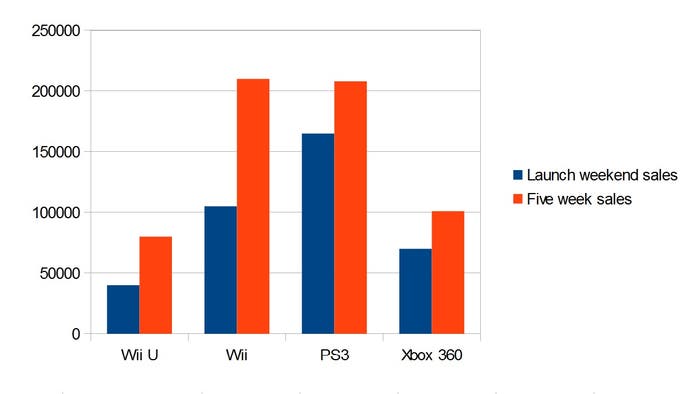
In terms of money made, it took four weeks for the Wii U to earn £18 million - the amount that the original Wii made in its launch week. That's despite all three Wii U launch bundles costing more, with the most popular Premium bundle priced at least £100 higher per unit.
Software attachment ratios also drive home the fact that, since launch, Wii U has commanded a far lower user base than other recent home console launches. The number of games bought by Wii U owners has grown at almost exactly the same rate as those snapped up by early Xbox 360, Wii and PS3 audiences. But the lack of software in recent UK charts points to the fact that this ratio is being applied to a far smaller user base. Three weeks after Wii U launched there was one exclusive game remaining in the top 40 (the pack-in game Nintendo Land, in 39th). Since then there have been none. After the equivalent amount of time following the Wii's launch, it had two games in the top 10 (Wario Ware: Smooth Moves and Wii Play, with Zelda: Twilight Princess a little further down the chart).
"It took four weeks for the Wii U to earn £18 million - the amount that the original Wii made in its launch week."
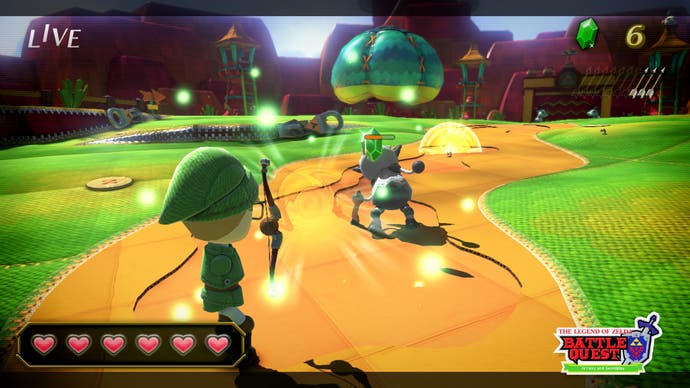
Outside of the UK, Nintendo's French office is the only other one to divulge sales figures so far in Europe. It reported that 118,000 units had been shifted by the end of 2012, around one and a half times the UK's total.
The most recent North American data shows that Wii U had sold nearly 890,000 units by 29th December, less than the Wii in the same time frame, but making more money due to the aforementioned difference in launch pricing. GameStop, which owns 6700 stores across North America, Europe and Australia, described the launch as "successful", and indicated it had shifted 320,000 consoles in the run up to Christmas - a number that equates to about 48 consoles sold per store.
In Japan, Wii U had sold 791,000 units by 20th January, numbers company Media-Create reported. Cumulative Japanese sales place it firmly in the middle-ground of recent console releases - above the launch sales trajectories of the PS3, PSP, Vita and GameCube, but below that of other Nintendo hardware such as the 3DS, DS, Wii, and also the PlayStation 2.
The last few weeks since Christmas have shown a worrying downward trend, however. Initially it seemed that sales in Japan had stabilised at around 65,000 per week. But the last two weeks have seen figures plummet post-New Year to around 20,000 and then 16,000. Last week, Wii U's seventh on sale in Japan, the console sold less than the struggling PlayStation Vita did at the same point in its life. News that the Wii U is fighting to maintain momentum in Nintendo's heartland asks questions as to the console's post-holiday legs worldwide.
Tot up sales for the UK, France, North America and Japan and you get a total of around 1.85 million units, albeit with data missing for much of the PAL region and North America since New Year. How many more sales would the rest of Europe contribute to this total? Not many, according to Piers Harding-Rolls, senior analyst and games boss at UK-based IHS Screen Digest.
"We would describe performance in both US and Japan as OK, with Europe considerably behind the level of these other territories," he told Eurogamer. "Judging by the disparity of performance it is clear that Nintendo concentrated its sales efforts on the US and Japan.
"Overall the platform did not hit our forecasts in any of its major sales territories," he continued. "We expected there to be more significant pent-up demand from Wii evangelists in this opening sales period. Based on current sales performance we believe Nintendo's guidance of 5.5 million Wii U shipments by end of March now looks aggressive."
"Based on current sales performance we believe the company's guidance of 5.5 million Wii U shipments by end of March now looks aggressive."
Piers Harding-Rolls, senior analyst and games boss, IHS Screen Digest
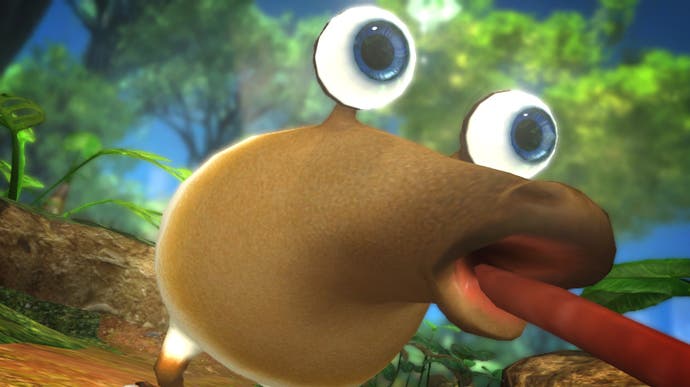
With the launch sales spike over, Wii U is nowhere near Nintendo's 5.5 million target for March. In the company's own words, Wii U has sold "steadily" - hardly glowing praise. Global boss Satoru Iwata admitted earlier this month that the Wii U had failed to muster the same level of demand visible at the Wii's launch. "At the end of the Christmas season, it wasn't as though stores in the US had no Wii U left in stock, as it was when Wii was first sold in that popular boom," he told Reuters. "But sales are not bad, and I feel it's selling steadily."
Industry analysts are more wary. "The performance so far is below my expectations," said Michael Pachter, famed crystal ball gazer at Wedbush Securities. "In fairness, [Nintendo's] forecast of 5.5 million global consoles shipped by 31st March was the reason my expectations were higher. The stock at retail suggests that they did ship around a million to the US [in time for Christmas], but they were not sold out. By way of comparison, they sold 1,090,000 Wiis in November and December 2006 in the US and were sold out.
"This device is simply not as highly in demand," he continued, "and although I didn't expect it to be over the long run, I did expect Nintendo fanboys to support it in bigger numbers at launch. It really is amazing that there are so few true hardcore Nintendo fanboys in the US, but they make so much noise."
It's a worry shared by fellow US analyst Doug Creutz, of financial research firm Cowen and Company. "I would say hardware sales have been a bit disappointing," Creutz told Eurogamer. "They are slightly behind the Wii and also behind the GameCube on a unit basis. Of a bit more concern are initial software sales, which are running at only about half the level of the Wii."
It all paints a fairly uninspiring picture. True, the console is still very much in its infancy, but these opening months can make or break a console - something Nintendo knows all too well with the 3DS. So what should the company do to give hardware sales a kick up the backside? Most industry watchers we talked to agreed Wii U needed more games and better marketing.
"We were really pleased with our official UK launch event and the ongoing sales through peak," HMV's games boss Andy Pinder told us. "The challenge that was always going to be there and perhaps still needs to be addressed to some extent is getting across that the Wii U is a totally new console and not just a touch-screen addition to the existing Wii console."
"It really is amazing that there are so few true hardcore Nintendo fanboys in the US, but they make so much noise."
Michael Pachter, managing director of equity research at Wedbush Securities
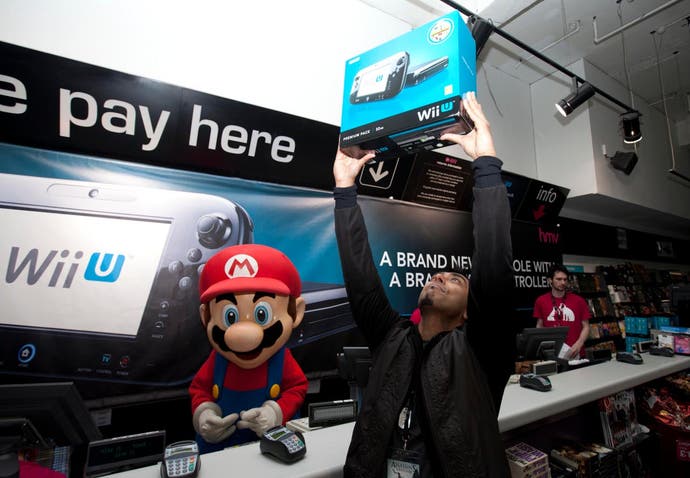
That this is still an issue now, two months after launch, speaks volumes for both the Wii U's lack of penetration within the public conscious, and the uphill battle Nintendo has yet to win making its marketing hit home. "They can't do anything other than market the device better," Pachter suggested. "The name of the device is confusing ('Wii U' could describe a peripheral, much in the way 'Wii Fit' did). I think many mainstream consumers are genuinely unaware that there is a new console out there."
One solution to this is quality, exclusive software - the sort of games people buy Nintendo hardware for - to help consumers awaken to the fact that Wii U is a very different offering.
"Looking forward," HMV's Pinder added, "there's an argument that there needs to be more triple-A games announced to really engage with Nintendo fans and key consumers and so build on the momentum that's already been achieved. Especially as the window before new products are rumoured to be launching later this year is not that long."
The problem with a poor hardware launch is that it can cause a rapid withdrawal of third-party support for the platform - evident to some extent now with PlayStation Vita. It's a self-fulfilling prophecy that sees under-performing hardware failing to attract games which could have gone on to sell systems.
There is already a strong indication that many third-party Wii U titles - big names from big franchises - have not performed well. Mass Effect 3, Assassin's Creed 3 and Batman: Arkham City have all been available since the console's launch, but have failed to register in UK charts.
"Publishers will generally be taking a wait-and-see attitude in relation to Wii U investment," Harding-Rolls reported. "Weak software tie ratios in this opening period will not have changed this position."
The boss of Crysis 3 developer Crytek revealed earlier this month that he would "love" to see the game released on Wii U, but that publisher EA - who supported the Wii U launch with several titles - lacked the "business drive" to do so. "If that business decision doesn't make sense, or seems to not make sense for them, it's not possible for us to make it," he said. "We can't publish ourselves, and that's the bottom line."
"Publishers will generally be taking a wait and see attitude in relation to Wii U investment. Weak software tie ratios in this opening period will not have changed this position."
Piers Harding-Rolls
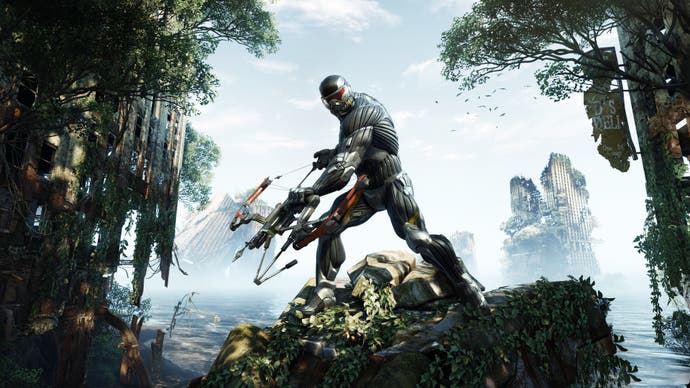
Once again, it seems like Nintendo must step in with its own games to prove the platform's worth. It's something that Jesse Divnich, VP of insights and analysis at Electronic Entertainment Design and Research, sees as essential. "We believe the long-term success or failure of the Wii U rests solely in the hands of Nintendo themselves," he said. "Most obvious is the development and release of high-quality first-party content, something we all know Nintendo can and will deliver."
It appears that Nintendo is already starting to react to this message. Before last week, Wii U owners could only look forward to a sparse release list of first-party games - some delayed from the console's launch window - such as Game & Wario and Pikmin 3. The list seemed especially scant considering the fact that Nintendo had essentially abandoned Wii development after Zelda: Skyward Sword in December 2011.
As if in anticipation of this week's financial results, Nintendo has just revealed a raft of new titles: new Yoshi and Fire Emblem games, a Zelda: The Wind Waker HD port, a new Monolith Soft RPG, plus confirmation that new 3D Mario, Mario Kart and Smash Bros. games would all be shown off at E3. All that plus hints at an all-new possibly-multiplayer and possibly open-world Zelda. The reveals came during an extraordinary Nintendo Direct broadcast, where Iwata apologised to fans that the immediate Wii U release schedule was bare.
"There are only a few titles that will be released by Nintendo for Wii U in January or February," he confessed. "Nintendo takes seriously its responsibility to offer a steady stream of new titles in the very early days of a new platform to establish a good line-up of software. On the other hand, we firmly believe we have to offer quality experiences when we release new titles.
"Based on our software development schedules at the end of last year, we concluded we should spend a little more time to satisfy our Nintendo standard of quality. I apologise to those supporting Wii U about the lack of new titles from Nintendo in January and February. But please understand we have new titles to offer from March onwards."
It was a performance reminiscent of Nintendo's entry into 'panic mode' to rescue the 3DS, when Iwata announced a price drop, promised new titles and unveiled the generous 3DS Ambassador scheme for early adopters. I.e. the very event which helped push Nintendo's financial results into the red last time. In another telling moment, Iwata offered a second explanation for why Wii U games were scarce - the simple fact that Nintendo was just one company with two current hardware platforms and only finite resources.
"Because the scope of game development for each title is getting larger and larger, we cannot prepare enough titles for Wii U with the same approaches as we have in the past," Iwata explained. The fact that the next Fire Emblem title will be a collaborative effort with Atlus is "an example of one of our new approaches", he continued. "We are working with many more partners on additional collaborations."
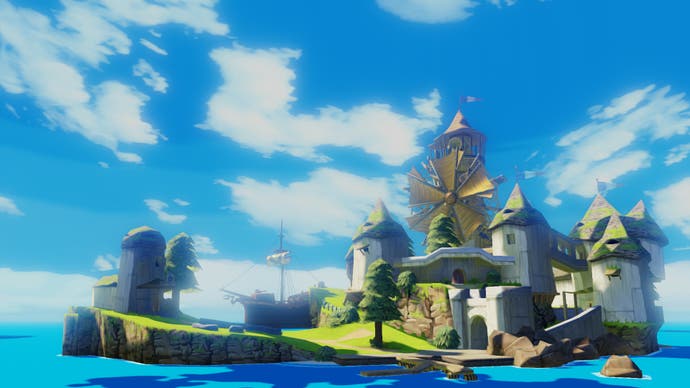
It felt like Nintendo was pulling out all the stops and doing everything it could to reignite long-term interest in Wii U - among gamers and those in the industry watching, cautiously weighing how well the console will perform. On the eve of the financial's release, it's a point that Nintendo wanted to reiterate when asked to comment on the Wii U's performance in the UK by Eurogamer.
"In the recent Nintendo Direct, Mr. Iwata gave us a glimpse of what's in development for Wii U, announcing two Zelda titles, a new 3D Mario action game, the latest Super Smash Bros. installment, Mario Kart, Yarn Yoshi and a new game from Monolith Soft to name just a few," Nintendo UK said in a statement. "We're excited about the year ahead and looking forward to watching the Wii U catalogue of games grow. The feedback that we've had so far on our Facebook and Twitter pages tells us that our fans are too."
Following the fan-pleasing Direct presentation, it felt the only way Nintendo could have gone further would have been to actually announce a price cut. But, with new other new consoles on the horizon, will a drop in price be necessary later in 2013? It would likely be an unattractive proposition for Nintendo, which already makes a loss on Wii U hardware. It would have to balance a poorer financial outlook and negative reaction from early adopters. And, while Wii U may appear expensive compared to the current late-lifecycle prices of PlayStation 3 and Xbox 360, it is likely to regain the Wii's position as the cheapest choice of console once Sony and Microsoft's next-gen machines launch.
"The price is only high relative to the current-generation consoles," Pachter explained. "If Microsoft and Sony cooperate by charging $399 or more for their next-generation consoles, I don't think that Nintendo's $349 price point is too high, particularly as the console bundle includes a pretty good first-party title."
"Consumer sentiment towards hardware price points generally equate to the value the consumer receives from the overall experience," Divnich concluded. "If the Wii U can deliver a strong high-quality software library, backed by an enjoyable digital media experience, we would argue no price cut is needed."
Nintendo has never chosen to go the easy route - eschewing the traditional console hardware race, betting big on motion gaming, adding extra screens, colouring their consoles purple. Should the company be worried by the Wii U's initial performance? Sales figures from Europe and the recent downward trend in Japan are worrying, but it is heartening to see the company already begin to correct course, announcing new games and teasing future collaborations. Has the company done enough to hold firm on in its financial forecast? We'll find out soon enough. But make no mistake - this week's financial results will be one of the most important in Nintendo's history.
